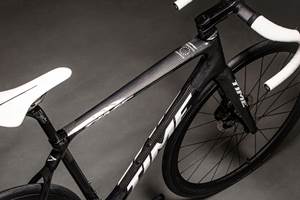University of South Alabama, MHP engage in research partnership for plastic composite material
ZT-CFRP, enriched with specifically oriented nanoparticles and reinforced with carbon fibers, shows considerable potential when compared to conventional CFRPs.
Share

Dr. Sebastian Kirmse (left), involved in the composite material’s research, and Tobias Hoffmeister (right), president and CEO of MHP Americas Inc. Photo Credit: MHP
Professor Kuang-Ting Hsiao's group at the University of South Alabama (Atlanta) have recently developed ZT-CFRP, an innovative plastic composite enriched with nanoparticles and reinforced with carbon fibers which was originally supported by NASA. Funded by the U.S. National Science Foundation (NSF), the university has set up a research partnership in order to fully exploit the potential offered by the advanced composite material and to ensure that ZT-CFRP can be brought to a wider market swiftly.
In addition to the University of South Alabama, five companies from a range of sectors have been involved in the partnership, including MHP (Atlanta, Ga., U.S.), Porsche Motorsports (Calif., U.S.), UST Mamiya (Fort Worth, Texas, U.S.), Hexcel Corp. (Stamford, Conn., U.S.) and Toray Composite Materials America (Tacoma, Wash., U.S.). MHP will reportedly play a key role in this collaboration by working closely with the university to support the design of a roll-to-roll production process for ZT-CFRP, which will enable large quantities of the material to be produced at low cost. The project aims to bring ZT-CFRP to market by 2024.
“Our colleague, Dr. Sebastian Kirmse, wrote his dissertation at the University of South Alabama and, during this time, was involved in the research for this new, exciting composite,” explains Tobias Hoffmeister, president and CEO of MHP Americas Inc. “When Sebastian joined MHP in early 2020, he informed us about the new technology and got us involved. We were all convinced that the composite material had considerable potential, right from the outset.”
The plastic composite, which is enriched with specifically oriented nanoparticles and reinforced with carbon fibers, is said to have a number of properties that make it stand out from other composite materials in this group. Carbon nanofibers are threaded between the conventional carbon fibers in a zigzag formation, producing a fabric in which the mechanical, electrical and thermal loads are distributed in all directions within the composite, significantly increasing the material's conductivity (especially orthogonal to the fiber direction). The university notes that this means that ZT-CFRP is not only lighter than aluminum and tougher than steel it is also significantly less vulnerable to mechanical forces, such as impact damage, than conventional carbon fiber-reinforced plastics (CFRPs).
ZT-CFRP will be available both in the form of a prepreg roll and as a thin resin film that can be used to optimize traditional prepreg materials or to adhesively join two materials with improved mechanical, thermal and electrical connection and durability.
ZT-CFRP is also said to open up a wide range of potential applications, from automotive, to space, to sports like golf. “With cars, for example, we are constantly trying to guarantee a high level of safety for passengers, while at the same time, striving to reduce weight and thus energy consumption,” explains Dr. Sebastian Kirmse. “ZT-CFRP could replace aluminum as the material of choice for the chassis. This wasn’t possible with conventional carbon fiber-reinforced plastics, especially for parts exposed to increased thermal load.” The new composite could also be used in a similar way in spacecrafts. In addition, golf clubs are expected to become lighter and more powerful with the material. Dr. Sebastian Kirmse further states that, due to its multifunctional properties, the material entails an expanded spectrum of possible applications, which will be explored during the project in collaboration with the partners.
Related Content
Time Bicycles to modernize composite bicycle manufacturing
With the aid of KraussMaffei, Clemson University and SC Fraunhofer USA Alliance, Time anticipates a transition to HP-RTM for more efficient carbon fiber bike frame manufacture, plus a new facility in South Carolina.
Read MoreMito Materials graphene amplify composite fly fishing rod performance
Functionalized graphene addition to premium-performance Evos and Evos Salt fly rods by St. Croix Fly enables faster recovery, increased torsional rigidity and improved strength-to-weight ratios.
Read MoreSyensqo provides PARA resin for Artiphon musical instrument
Artiphon has chosen Syensqo’s Ixef PARA fiber-filled resin in the production of Chorda, its custom handheld electronic musical instrument.
Read MoreCarbon Mobile carbon fiber powers handheld gaming platform
HyRECM technology effectively stabilizes carbon fiber’s electrical and antenna properties, enabling development of next-gen electronics, such as the Snapdragon G3x Gen 2.
Read MoreRead Next
VIDEO: High-volume processing for fiberglass components
Cannon Ergos, a company specializing in high-ton presses and equipment for composites fabrication and plastics processing, displayed automotive and industrial components at CAMX 2024.
Read MoreAll-recycled, needle-punched nonwoven CFRP slashes carbon footprint of Formula 2 seat
Dallara and Tenowo collaborate to produce a race-ready Formula 2 seat using recycled carbon fiber, reducing CO2 emissions by 97.5% compared to virgin materials.
Read MorePlant tour: Daher Shap’in TechCenter and composites production plant, Saint-Aignan-de-Grandlieu, France
Co-located R&D and production advance OOA thermosets, thermoplastics, welding, recycling and digital technologies for faster processing and certification of lighter, more sustainable composites.
Read More

























